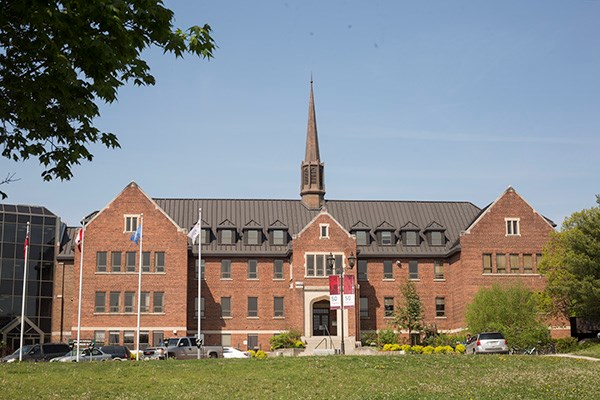Algoma University’s 2024-25 budget includes record spending on hiring of new staff and construction of new buildings.
Approved by the institution’s board of governors Thursday, the $233.8 million budget allows for the hiring of nearly 200 additional people, including 161 staff and leadership roles and 33 new full-time faculty members in the long term.
Dramatic growth is anticipated in the number of students and faculty in Algoma University’s School of Computer Science and Technology between now and 2028-29.
Enrolment in the School of Computer Science and Technology included approximately 2,500 students in 2023-24 but is expected to increase to 2,870 by 2028-29 due to increased demand for trained professionals in the field. 1,500 students are anticipated to be enrolled in Algoma’s Master of Computer Science program by 2028-29. Total enrolment in all Computer Science and Technology programs is anticipated to be at 4,370 by 2028-29.
As a result, the number of faculty in the department is expected to increase from 13 this year to 43 by 2028-29.
Algoma will spend over $70 million in salaries, an increase of more than $10 million compared to 2023-24.
“As a public university, our increased revenue is a mix of tuition generated from increased enrolment compared to our historic averages as well as some additional government funding,” wrote Erin Morrison, Algoma University director of strategic marketing and communications, in an email to SooToday.
The budget is based on an enrolment of 10,740 full time equivalent students.
Craig Fowler, Algoma’s vice-president of growth, international and external relations said that was a cautious and prudent estimate.
“New job creation will happen across all three Algoma University campuses. Leadership job postings most often list all three campuses (Sault Ste. Marie, Brampton, Timmins) as a potential work location. On the faculty side, we are projecting 21 new full-time faculty jobs in Brampton and 12 in Sault Ste Marie (for 2024-25). Over half of the new full-time faculty will be in Computer Science and Business and Economics,” Morrison wrote.
The budget will also see $44 million spent on new capital projects.
Algoma University’s upcoming new building projects include:
- Makwa Waakaa’igan in Sault Ste. Marie, a global centre of cross-cultural excellence which will also house the Northern Ontario Mental Health and Addictions Research and Training Institute. Makwa Waakaa’igan will replace the university’s existing E Wing.
- A new student residence in Brampton with more than 500 bedrooms
- Completing renovations at 145 Queen St. in Brampton, which will be used for social work programming and will house the Peel Region Ontario Mental Health and Addictions Research and Training Institute.
After the federal government’s January announcement of a two-year cap on the number of international student study permits, the province has allowed Algoma a maximum of 3,038 Provincial Attestation Letters (one per new international student) for the coming school year.
Much of Algoma's student body consists of international students.
Some international students accepted to Algoma may choose another university or not attend university at all this fall, Morrison told SooToday after Thursday’s board meeting.
“It's too early to give a breakdown of confirmations because international students will not necessarily have registered yet. Algoma University has already prepared to adapt to the cap on international students by slowing international registration and increasing domestic recruitment. The university's permit allocation is similar to its 2022-23 intake of international students, but a decrease compared to 2023-24,” wrote Megan Parlowe, Algoma University spokesperson, in an email.
Asima Vezina, Algoma University president, stated in April that the institution realistically expects between 2,000 to 2,500 international students to attend in the fall of 2024.
Algoma will also be spending more on academics and research.
$2.7 million will go into an academic strategic initiatives fund, giving faculty members funding to pursue academic projects.
For 2024-25, Algoma is also budgeting $28.4 million for student scholarships and bursaries, up from about $24.3 million in 2023-24.
“Algoma University is deeply rooted in our communities, Brampton, Sault Ste. Marie and Timmins,” stated Asima Vezina, Algoma University president and vice-chancellor in a release.
“When we invest in bricks and mortar—classrooms, a new residence, and centres of excellence—we’re giving our students the state of the art facilities they need to excel. But we’re also giving the communities we love more gathering places, more jobs, more economic activity and assets that will last for generations, especially when you consider projects like the Ontario Mental Health and Addictions Research and Training Institute, which will serve unique community needs. Building and investing for the future is a priority for us because we are members of these communities, and when Brampton, Sault Ste. Marie and Timmins succeed, Algoma University succeeds,” Vezina wrote.
“Algoma University continues to be in a strong, stable financial position,” wrote Kramer Rousseau, interim vice-president of finance and operations.
“That’s incredibly important, because we not only have a major economic impact on the communities around us, we also have a powerful human impact. When Algoma U is financially healthy, we can give out more scholarships and bursaries to change more lives. We can create more good jobs. We can invest in the impactful research that helps protect people and our planet. And we can really build for the future—not only building exciting new programs, but also seeing incredible spaces like Makwa Waakaa’igan rise, creating a space that will change life for generations who do important work there,” Rousseau wrote.
